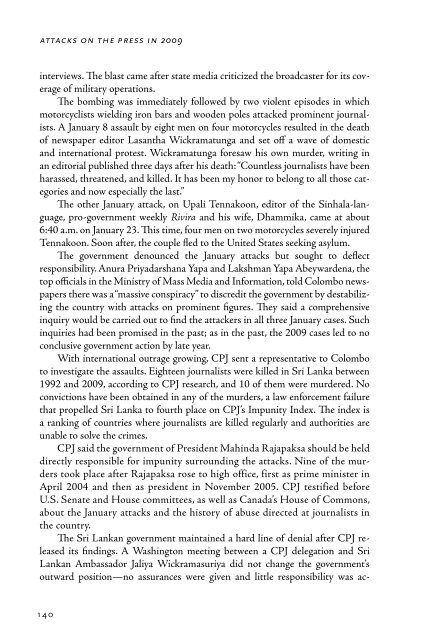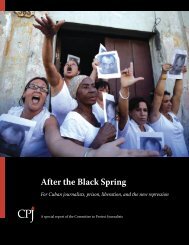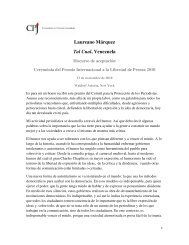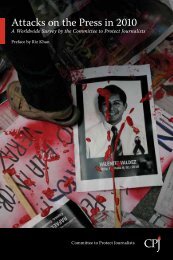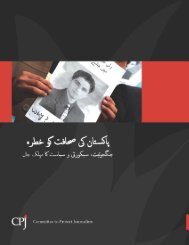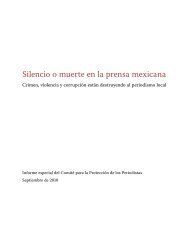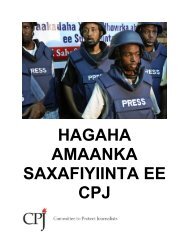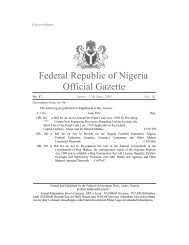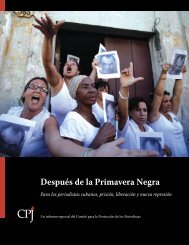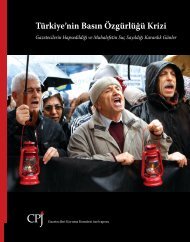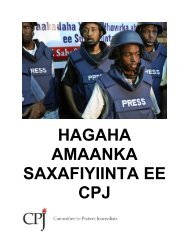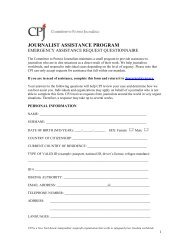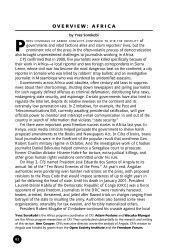Attacks on the Press - Committee to Protect Journalists
Attacks on the Press - Committee to Protect Journalists
Attacks on the Press - Committee to Protect Journalists
- No tags were found...
You also want an ePaper? Increase the reach of your titles
YUMPU automatically turns print PDFs into web optimized ePapers that Google loves.
attacks <strong>on</strong> <strong>the</strong> press in 2009asia: sri lankainterviews. The blast came after state media criticized <strong>the</strong> broadcaster for its coverageof military operati<strong>on</strong>s.The bombing was immediately followed by two violent episodes in whichmo<strong>to</strong>rcyclists wielding ir<strong>on</strong> bars and wooden poles attacked prominent journalists.A January 8 assault by eight men <strong>on</strong> four mo<strong>to</strong>rcycles resulted in <strong>the</strong> deathof newspaper edi<strong>to</strong>r Lasantha Wickramatunga and set off a wave of domesticand internati<strong>on</strong>al protest. Wickramatunga foresaw his own murder, writing inan edi<strong>to</strong>rial published three days after his death: “Countless journalists have beenharassed, threatened, and killed. It has been my h<strong>on</strong>or <strong>to</strong> bel<strong>on</strong>g <strong>to</strong> all those categoriesand now especially <strong>the</strong> last.”The o<strong>the</strong>r January attack, <strong>on</strong> Upali Tennako<strong>on</strong>, edi<strong>to</strong>r of <strong>the</strong> Sinhala-language,pro-government weekly Rivira and his wife, Dhammika, came at about6:40 a.m. <strong>on</strong> January 23. This time, four men <strong>on</strong> two mo<strong>to</strong>rcycles severely injuredTennako<strong>on</strong>. So<strong>on</strong> after, <strong>the</strong> couple fled <strong>to</strong> <strong>the</strong> United States seeking asylum.The government denounced <strong>the</strong> January attacks but sought <strong>to</strong> deflectresp<strong>on</strong>sibility. Anura Priyadarshana Yapa and Lakshman Yapa Abeywardena, <strong>the</strong><strong>to</strong>p officials in <strong>the</strong> Ministry of Mass Media and Informati<strong>on</strong>, <strong>to</strong>ld Colombo newspapers<strong>the</strong>re was a “massive c<strong>on</strong>spiracy” <strong>to</strong> discredit <strong>the</strong> government by destabilizing<strong>the</strong> country with attacks <strong>on</strong> prominent figures. They said a comprehensiveinquiry would be carried out <strong>to</strong> find <strong>the</strong> attackers in all three January cases. Suchinquiries had been promised in <strong>the</strong> past; as in <strong>the</strong> past, <strong>the</strong> 2009 cases led <strong>to</strong> noc<strong>on</strong>clusive government acti<strong>on</strong> by late year.With internati<strong>on</strong>al outrage growing, CPJ sent a representative <strong>to</strong> Colombo<strong>to</strong> investigate <strong>the</strong> assaults. Eighteen journalists were killed in Sri Lanka between1992 and 2009, according <strong>to</strong> CPJ research, and 10 of <strong>the</strong>m were murdered. Noc<strong>on</strong>victi<strong>on</strong>s have been obtained in any of <strong>the</strong> murders, a law enforcement failurethat propelled Sri Lanka <strong>to</strong> fourth place <strong>on</strong> CPJ’s Impunity Index. The index isa ranking of countries where journalists are killed regularly and authorities areunable <strong>to</strong> solve <strong>the</strong> crimes.CPJ said <strong>the</strong> government of President Mahinda Rajapaksa should be helddirectly resp<strong>on</strong>sible for impunity surrounding <strong>the</strong> attacks. Nine of <strong>the</strong> murders<strong>to</strong>ok place after Rajapaksa rose <strong>to</strong> high office, first as prime minister inApril 2004 and <strong>the</strong>n as president in November 2005. CPJ testified beforeU.S. Senate and House committees, as well as Canada’s House of Comm<strong>on</strong>s,about <strong>the</strong> January attacks and <strong>the</strong> his<strong>to</strong>ry of abuse directed at journalists in<strong>the</strong> country.The Sri Lankan government maintained a hard line of denial after CPJ releasedits findings. A Washingt<strong>on</strong> meeting between a CPJ delegati<strong>on</strong> and SriLankan Ambassador Jaliya Wickramasuriya did not change <strong>the</strong> government’soutward positi<strong>on</strong>—no assurances were given and little resp<strong>on</strong>sibility was ac-cepted. The acts of intimidati<strong>on</strong> and <strong>the</strong> absence of substantive government resp<strong>on</strong>sedrove at least 11 Sri Lankan journalists in<strong>to</strong> exile between June 2008 andJune 2009, CPJ research found. Sri Lankan journalists accounted for more thana quarter of <strong>the</strong> journalists worldwide who fled <strong>the</strong>ir countries during that periodafter being attacked, harassed, or threatened with violence or impris<strong>on</strong>ment, according<strong>to</strong> CPJ research.January’s attacks and intimidati<strong>on</strong> c<strong>on</strong>tinued through <strong>the</strong> year. Typical was<strong>the</strong> June 1 kidnapping of <strong>the</strong> general secretary of <strong>the</strong> Sri Lanka Working <strong>Journalists</strong>Associati<strong>on</strong>, Poddala Jayantha. He was abducted <strong>on</strong> a busy road in Colomboduring rush hour, beaten, and dropped by <strong>the</strong> side of a road in a suburb. Witnessesat <strong>the</strong> scene said six unidentified men in a white Toyota Hi Ace van with tintedglass windows had grabbed him; <strong>the</strong> same type of vehicle has been used <strong>to</strong> pick upantigovernment figures in <strong>the</strong> past. No arrests had been made by late year.In July, domestic access <strong>to</strong> <strong>the</strong> independent Lanka News Web was shut down.The site’s managers received no formal explanati<strong>on</strong> but suspected <strong>the</strong> shutdownstemmed from a s<strong>to</strong>ry reporting that <strong>the</strong> president’s s<strong>on</strong> had been <strong>the</strong> target ofst<strong>on</strong>e throwers at a Tamil refugee camp. Around <strong>the</strong> same time, <strong>the</strong> official Website of <strong>the</strong> Ministry of Defense carried an article headlined, “Trai<strong>to</strong>rs in BlackCoats Flocked Toge<strong>the</strong>r,” which identified five lawyers who represented <strong>the</strong> SundayLeader newspaper at a July 9 hearing in a Mount Lavinia court as having “a his<strong>to</strong>ryof appearing for and defending” LTTE guerrillas. The article included picturesof three of <strong>the</strong> lawyers, making <strong>the</strong>m identifiable <strong>to</strong> government supporters whomight accost <strong>the</strong>m.CPJ pressed for journalists <strong>to</strong> be allowed access <strong>to</strong> <strong>the</strong> c<strong>on</strong>flict z<strong>on</strong>es. Both<strong>the</strong> government and <strong>the</strong> LTTE had barred <strong>the</strong> press. Reporters who did try <strong>to</strong>cover <strong>the</strong> major humanitarian catastrophe taking place in <strong>the</strong> heart of <strong>the</strong> IndianOcean regi<strong>on</strong> were obstructed. A team from Britain’s Channel 4 News—Asiacorresp<strong>on</strong>dent Nick Pat<strong>on</strong> Walsh, cameraman Matt Jasper, and producer BessieDu—were ordered <strong>to</strong> leave <strong>the</strong> country <strong>on</strong> May 10 by Defense Secretary GotabayaRajapaksa. Channel 4 had just aired footage filmed secretly in a Tamil refugeecamp in <strong>the</strong> nor<strong>the</strong>rn city of Vavuniya. The report included allegati<strong>on</strong>s thatguards had left corpses <strong>to</strong> rot, that food and water were in short supply, and thatsexual abuse was prevalent. A m<strong>on</strong>th later, <strong>on</strong> July 20, Associated <strong>Press</strong> BureauChief Ravi Nessman was ordered out <strong>the</strong> country when <strong>the</strong> government refused<strong>to</strong> renew his visa.By mid-year it was clear that, even with its vic<strong>to</strong>ry in <strong>the</strong> war against <strong>the</strong>LTTE, <strong>the</strong> government was not going <strong>to</strong> back away from its policies of intimidati<strong>on</strong>.That reality was driven home <strong>on</strong> August 31, when columnist J.S. Tissainayagam,also known as Tissa, was sentenced <strong>to</strong> 20 years in pris<strong>on</strong> <strong>on</strong> chargesof violating <strong>the</strong> country’s harsh anti-terror law. After his c<strong>on</strong>victi<strong>on</strong>, <strong>the</strong> first in140141


